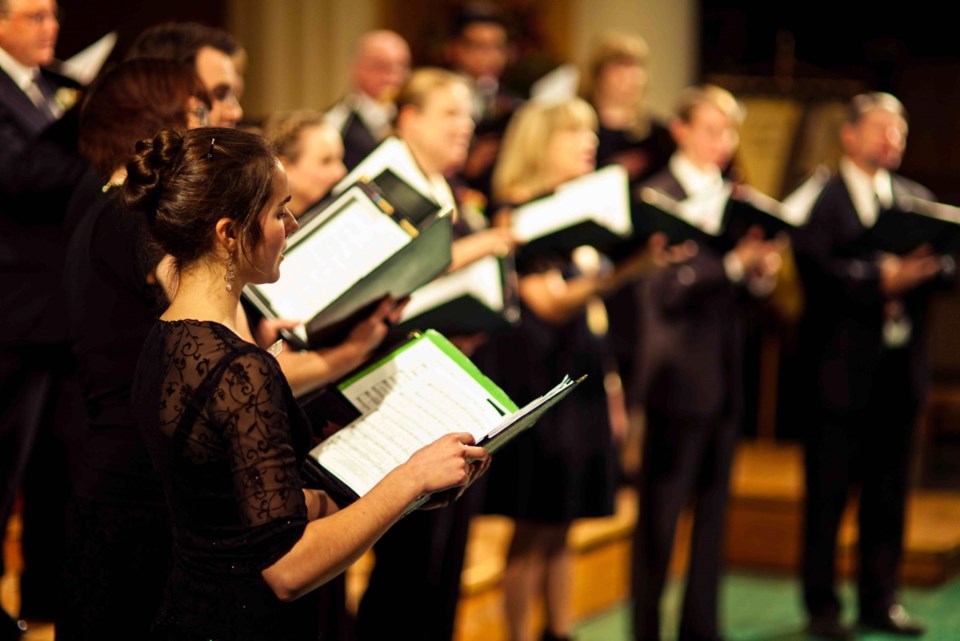The coming weekend’s concert schedule is even busier than last weekend’s.
On Friday evening, for instance, American art critic Kay Larson will visit the University of Victoria’s School of Music to discuss and direct a performance of John Cage’s Zen-influenced Lecture on Nothing (finearts.uvic.ca/music/calendar/events), while Vox Humana will offer a program culminating in American composer David Lang’s powerful, Pulitzer Prize-winning The Little Match Girl Passion (2007), which the chamber choir previously performed, in different versions, in 2013 and 2015 (voxhumanachoir.ca).
On Saturday evening, the Victoria chapter of the Royal Canadian College of Organists will sponsor a family-friendly Halloween Organ Special at St. Andrew’s Presbyterian Church, showcasing local performers and including a screening of Buster Keaton’s short silent comedy The Haunted House with live accompaniment (rcco-victoria.org).
And on Sunday afternoon, the Sooke Philharmonic Orchestra will launch its season with two big works, Haydn’s last symphony (No. 104) and Brahms’s Violin Concerto, the latter featuring 20-year-old Jeanel Liang, a UVic music student who won the orchestra’s annual concerto competition for young performers (sookephil.ca).
Two early-music concerts on Saturday are particularly noteworthy, though, alas, they will run simultaneously.
The Victoria Philharmonic Choir will open its season with a magnificent unfinished work by Mozart that, for once, is not the Requiem: the Mass in C Minor, K. 427 (7:30 p.m., Farquhar Auditorium, UVic Centre, $39.50/$13.50, under 13 free; vpchoir.ca).
The C-minor Mass is one of very few works that Mozart undertook for entirely personal reasons, which included a vow he made to God to write a Mass should his new wife recover from birth of their first child (which she did). But however strong the impetus, Mozart rarely finished a work without some immediate practical end (performance, publication) in mind, which he evidently did not have in this case.
That’s a shame: Completed, this ambitious, highly original, extraordinarily intense, impressively wide-ranging work would have rivalled Bach’s B-minor Mass and Beethoven’s Missa solemnis in size and scope.
But Mozart did leave behind about 50 minutes’ worth of music, comprising a Kyrie, a Gloria, the opening of a Credo, a Sanctus and a Benedictus — and sacred choral music gets no better than this.
The VPC’s concert will open with a half-hour-long Vespers setting Mozart wrote in 1780 while employed as a court musician in his native Salzburg.
Saturday’s concert of the Early Music Society of the Islands will also be a season-opener, as its Oct. 5 concert had to be cancelled at the last minute. It will mark the Victoria debut of the London Haydn Quartet, an internationally celebrated period-instrument ensemble founded in 2000 (8 p.m., Alix Goolden Hall, $30/$25/$23, student rush $8; pre-concert talk 7:10; earlymusicsocietyoftheislands.ca).
The program opens with Haydn’s late, popular “Lark” Quartet and Beethoven’s first published quartet, Op. 18/No. 1. (The LHQ has been systematically recording all of Haydn’s quartets since 2007, to great acclaim.) The LHQ will also join clarinetist Eric Hoeprich in Weber’s delightful Clarinet Quintet. Hoeprich recorded the Weber (splendidly) in 2007, but in June, made a new recording of it with the LHQ, with whom he has also recorded the Mozart and Brahms quintets.
Finally, on Sunday, the Aventa Ensemble, our premier contemporary-music ensemble, will launch its season with, they tell us, what is “widely considered to be one of the most influential works of the late 20th century”: Vortex temporum, by Gérard Grisey (8 p.m., Phillip T. Young Recital Hall, $20; pre-concert talk 7:15; aventa.ca).
Completed in 1996, two years before Grisey’s death, this 40-minute, three-movement work is scored for six players: flute, clarinet, violin, viola, cello and piano.
One of the most important and influential French composers in the generation after Boulez, Grisey became, in the 1970s, a principal exponent of a new idiom known as “spectral music,” in which compositional materials are drawn from analysis of the acoustic properties of sound. The music of Vortex temporum is adventurous and kaleidoscopic, evidence of an extraordinary imagination, and spans a huge range in terms of texture, colour, technique and expression.
Aventa’s concert will open with two shorter chamber works: Scintillation (1993), by Danish composer Per Nørgård; and Everything is… distorted (2017), by Toronto-based Bekah Simms.



